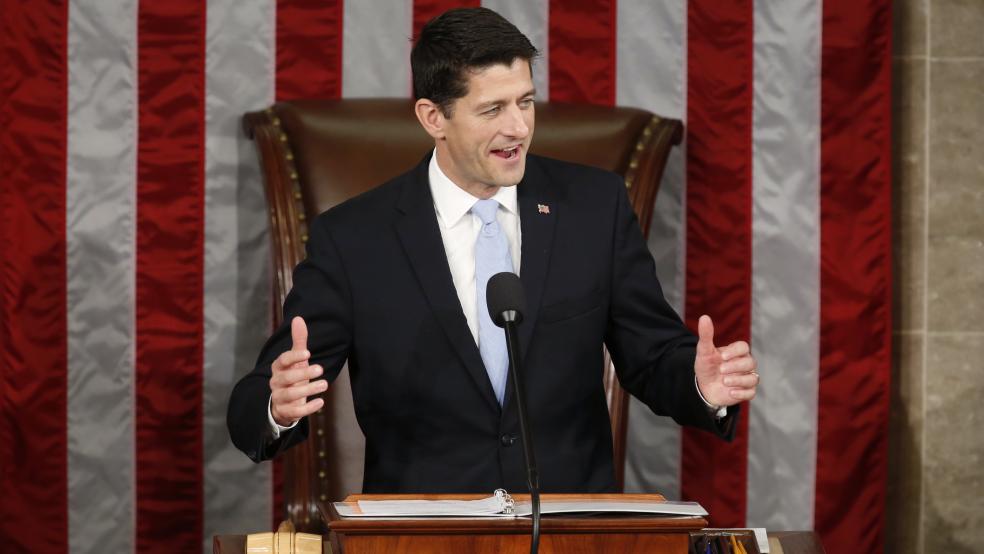Recently ensconced House Speaker Paul Ryan (R-WI) pulled together his fractious GOP conference to support a five-year, $300 billion transportation bill that President Obama has promised to sign late this week.
The bill not only boosts annual spending on highways, bridges and mass transit and papers over troubling funding shortfalls, but also includes a measure that reauthorizes the U.S. Export-Import Bank after a long political feud over the bank’s fate.
Related: Congress Finally Passes a $300 Billion Highway Bill
Now, Ryan and Senate Majority Leader Mitch McConnell (R-KY) are turning their attention to solving the legislative Rubik’s cube of passing a major new spending bill to keep the government operating beyond a Dec. 11 deadline.
And the perennial fears of another shutdown are once again with us.
While it’s far too soon to push the panic button, the White House and congressional Democrats on Wednesday warned of another pre-Christmas fiscal crisis unless House Republicans relent in their push to lace the fiscal 2016 omnibus spending bill with “poison pill” amendments.
The policy riders being sought by House conservatives include a toughening of the immigration screening process for refugees fleeing violence in Syria and Iraq and denying funds to the Environmental Protection Agency to enforce curbs on emissions from coal-fired power plants. Republicans also want to undo parts of the 2010 Dodd-Frank financial reform legislation and withhold funding from the Planned Parenthood organization.
House Minority Leader Nancy Pelosi (D-CA) and White House spokesperson Josh Earnest denounced the proposed amendments. They warned that the Republicans were once again flirting with the possibility of another government shutdown like the one in the fall of 2013 that caused havoc for government workers and many Americans counting on government services.
Related: Paul Ryan Flexes His Conservative Muscles in Contrast to Boehner
Earnest said that congressional Republicans were “whistling past the graveyard of a government shutdown” by trying to “lard the bill up with ideological riders” in order “to compensate for their pretty sorry legislative record thus far this year.”
Ryan’s office said that the spending proposals were crafted by the House Appropriations Committee with the speaker’s support and constituted a good-faith effort to pass long-term spending legislation before the current short-term continuing resolution runs out next week.
“According to the Constitution, Congress controls the nation’s purse strings and there have always been policy riders on spending bills. This is a bipartisan practice,” Ryan spokesperson Doug Andres told The Hill. “And as we move forward, we expect Democrats to do their part to be constructive in this process.”
House Republicans traditionally have voted in large numbers against major year-end appropriations bills on both fiscal and political grounds – frequently leaving it up to the Democrats to carry the controversial spending legislation across the goal line. There are reports that with Ryan now at the helm, a surprising number of conservative lawmakers are signaling they might support the spending package this month – provided they can strike a compromise on policy language.
Related: The New Budget Deal Is Washington Vote Buying at Its Finest
For example, members of the far-right Freedom Caucus, which helped drive former House Speaker John Boehner (R-OH) into retirement, are hinting at a compromise over Planned Parenthood funding that would give states the authority to decide whether to provide funds, according to Roll Call. There have also been suggestions to make restrictions on Syrian refugee immigrations more politically palatable.
“I don’t think we want to overreach,” Rep. Matt Salmon (R-AZ), one of the Freedom Caucus ringleaders, told Roll Call. “We’d like to figure out something that is doable.”
But Earnest warned that if the Republicans go back to a strategy of trying to pass major legislation along strict party lines, they’ll see that the process doesn’t work. “They can go ask former Speaker John Boehner how well that process worked.”





